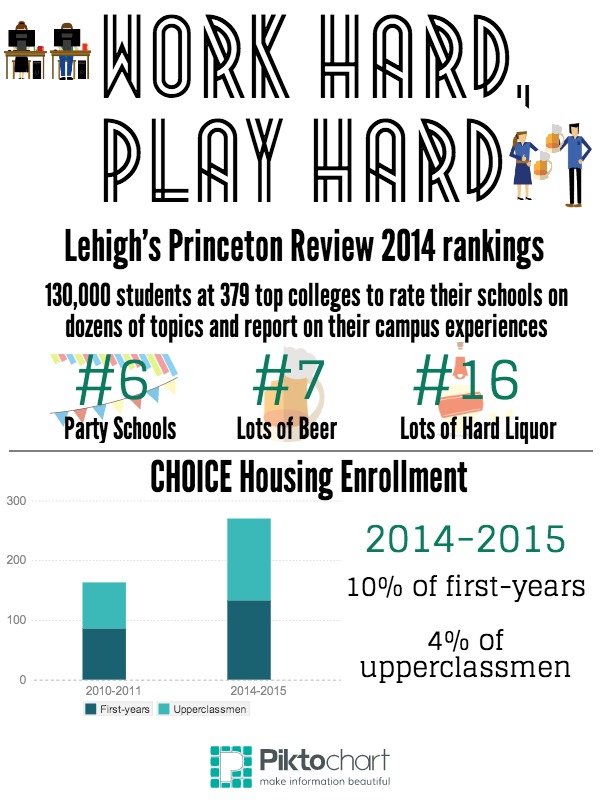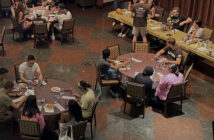“Work hard, play hard.”
It’s been said that this is the unofficial motto of Lehigh University, describing many students’ ability to have a thriving social life and still consistently perform well in the classroom. This dichotomy is exhibited on The Princeton Review’s page about Lehigh: it’s listed as highly selective and one of the best Northeastern schools, but it also appears high on the lists of Lots of Hard Liquor (#16), Lots of Beer (#7) and Party Schools (#6).
Lehigh achieved the number six spot on the Princeton Review’s 2014 list of Party Schools, beating out famed party school Pennsylvania State University, which ranked at number seven. Lehigh moved up from its 2013 spot of number 10 after not even cracking the top 20 in 2012.
Syracuse University took the number one spot this year.
How accurate is this ranking, and how does it affect both current and prospective students?
The Princeton Review states that the results of all of its lists are based on a “survey that asked 130,000 students at 379 top colleges to rate their schools on dozens of topics and report on their campus experiences.”
“It’s not the most statistically vetted system,” said Matt Cunningham, assistant director of admissions. He receives questions, mainly from parents of prospective students, asking for clarification and elaboration on The Princeton Review‘s ranking. Cunningham said he gives them a very balanced answer:
“If (students) go looking for (partying), will they find it? Yes, but there are other opportunities,” Cunningham said, listing examples such as University Productions, trips, movies and speaker series. “How much of a role it plays in their experience is up to them.”
Cunningham advises student tour guides to share similar answers with families during tours and not to lie. Chris Gramley, ’16, is a tour guide who said he is not asked very often about partying at Lehigh and, when he is, it is a quick and single question.
“People almost seem like they don’t want to address it on the tour,” Gramley said.
His answer aligns with Cunningham’s: that partying can be found on any campus and can be found if you look for it, but that there are other late-night alternatives, as well.
Gramley said he knew somewhat of Lehigh’s party reputation before coming here, but that it didn’t positively or negatively influence his decision to attend.
“I knew there would be other alternatives if I wanted to choose them,” he said.
Some students did not know of Lehigh’s party reputation before arriving on campus, like Bess Lorman, ’18.
“It wasn’t something I looked at when I looked at schools,” she said. Lorman said she was surprised when she discovered the magnitude of Lehigh’s partying, but was not bothered by it.
Lauren Molina, ’16, also hadn’t heard of Lehigh as a high-ranking party school until after beginning her first year.
“I had no idea,” Molina said. “I found out a few weeks after I got here. It was something on Facebook…a girl talking about how Lehigh was a huge party school.”
Cunningham said he thinks the rankings and reputation can overshadow other aspects of Lehigh that prospective students should be considering instead.
“If they focus on that, they might miss alternatives and other features of Lehigh,” he said.
Lorman and Molina both said knowing about the reputation wouldn’t have influenced their decisions to attend here.
“I chose Lehigh because of its strong engineering program,” Lorman said. “It doesn’t affect my academics.”
Molina acknowledged the choice to go out or stay in and said nobody is forcing anybody to choose either way.
Lehigh students can also choose to live in CHOICE housing. CHOICE is a residential community where students commit to not consume alcohol, use tobacco products or use illegal substances in their residence hall and to not return to their residence hall intoxicated or under the influence of substances, as stated on Lehigh’s housing page.
Numbers of students enrolled in CHOICE have been consistently increasing since the 2010-2011 school year, for both first-year and upperclassman students, according to statistics provided by Residential Services. In 2010-2011, 86 first-year students and 77 upperclassman students were enrolled; this year, 133 first-year students and 137 upperclassman students are enrolled — approximately 10 percent of first-year students and four percent of upperclassman students.
Cunningham said he doesn’t think the party-school reputation has had any impact on admissions or enrollment to Lehigh, although there has been an increase in applications overall and a solid return on offers.
“(Prospective students) are still finding out Lehigh is a great fit…I think they’re attracted to other opportunities and the aspects of the culture,” Cunningham said.
Do students think Lehigh lives up to its higher-than-Penn State ranking?
“Just because it’s become a huge, nationally known party school, people feel they have to uphold that reputation,” Molina said. “So I think we’re becoming more and more party-oriented.”
“I think it’s incredible that Lehigh is so highly ranked in both the academic world and the college party scene world,” Gramley said. “It’s a very interesting dynamic that very few other schools can boast.”






Comment policy
Comments posted to The Brown and White website are reviewed by a moderator before being approved. Incendiary speech or harassing language, including comments targeted at individuals, may be deemed unacceptable and not published. Spam and other soliciting will also be declined.
The Brown and White also reserves the right to not publish entirely anonymous comments.